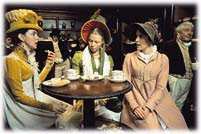 Last night I went to see the opera Tosca and it got me thinking about something we talk about quite a lot here, as readers and writers–the topic of historical authenticity.
Last night I went to see the opera Tosca and it got me thinking about something we talk about quite a lot here, as readers and writers–the topic of historical authenticity.
Tosca is an opera in the verismo tradition–that is, it’s written to show human passions and emotions in easily recognizable settings (this is opera, if you’re thinking, well duh, what else would you write about? Rather than, for instance, choosing a storyline starring classical heroes or gods and goddesses.) Based on a play by Victorien Sardou, Puccini’s opera refers to real events–the Battle of Marengo; the political situation in Rome, which had briefly been a republic before an official crack-down; and using real locations, including the Castel Sant’Angelo with its statue of St. Michael.
 And I just have to stop and say the sets were outstanding, the singing even more so, and it was a glorious evening. This is possibly my favorite opera–what’s not to love? Gorgeous music, a radical lefty hero, a deliciously pervy villain, and the all-too-human Floria Tosca (the pic above is of Maria Callas, urguably the greatest Tosca of all time).
And I just have to stop and say the sets were outstanding, the singing even more so, and it was a glorious evening. This is possibly my favorite opera–what’s not to love? Gorgeous music, a radical lefty hero, a deliciously pervy villain, and the all-too-human Floria Tosca (the pic above is of Maria Callas, urguably the greatest Tosca of all time).
But back to what I’m really talking about. With all his painstaking attention to historical detail, Puccini and his lyricists made one massive error (and Sardou may have as well; to be honest I don’t know). Floria Tosca is a singer. In Rome. In 1800. Uh oh. Only castrati were allowed to sing in Rome then, never women. But Puccini knew what he was doing–Tosca is an artist whose life revolves around her career and love, and that’s why she’s the impulsive, passionate woman who drives the story of the opera. So it’s an error that pays off, bigtime.
And I wonder if you’ve read a book, or written one, where the truth was sacrificed for the story and it didn’t matter, or in fact improved it? Fortuitous errors?
The postscripts: George Bernard Shaw called Tosca “a shabby little shocker.” Pic of the Castel Sant’Angelo courtesy of the City of Rome, and read more about the opera here, and read the Washington Post review of the production I saw. And hop on over to the Spiced Tea Party today where Jane Lockwood will be blogging about the Big O and how to write it.
Janet





